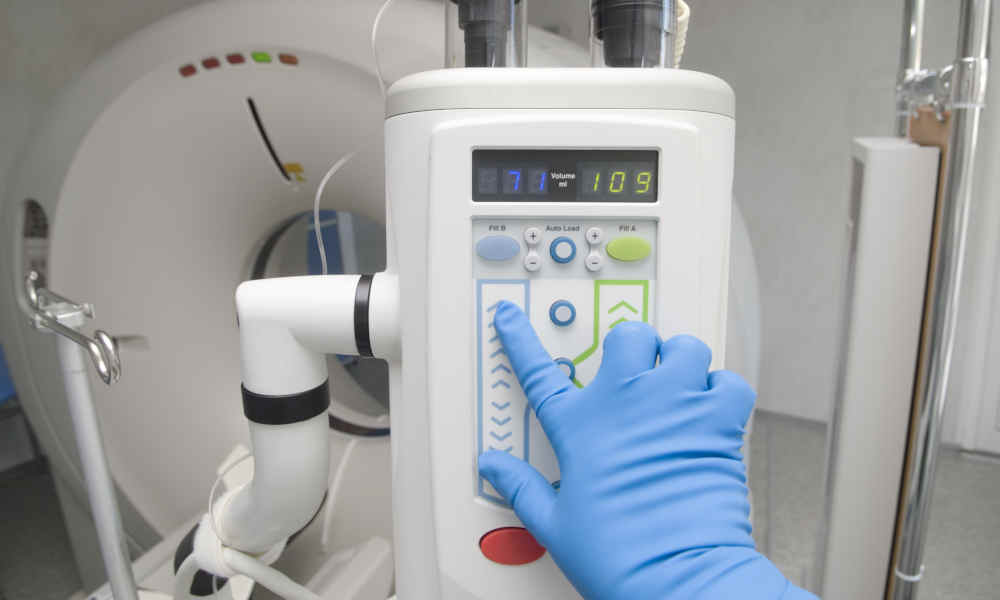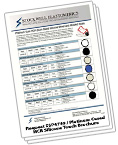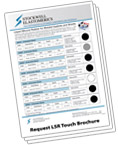Market
Medical Grade Silicone Rubber
USP Class VI silicone rubber for medical devices and equipment
USP Class VI silicone rubber for medical devices and equipment

Stockwell Elastomerics manufactures USP Class VI silicone rubber parts for medical diagnostic devices and other medical applications. These cut and molded medical components include enclosure gaskets, housing gaskets, and vibration or dampening pads for medical devices and equipment. OEMs provide engineering drawings and specify the durometer and color of the USP Class VI silicone that’s required.
The USP Class VI silicones that Stockwell Elastomerics fabricates are used in non-implantable applications, and in surface contact applications where there is no exchange of blood or bodily fluids. These medical grade materials can withstand gamma radiation, autoclaving, or ethylene oxide (EtO) sterilization with minimal effect on material properties. Sample swatches for trial sterilizations and other validation testing are available.
Fabrication at Stockwell Elastomerics involves cutting FDA high consistency rubber (HCR) and injection molding FDA liquid silicone rubber (LSR) into custom medical components. Both types of medical grade rubber are platinum cured (addition cured) because this process does not generate the organic acids that are commonly produced with peroxide curing.
Stockwell Elastomerics does not provide fabricated or molded articles that are designed for use in the body or articles that make direct contact with wounds or irritated skin. View Stockwell Elastomerics’ Support for the Medical Device Industry statement regarding fabricated and molded gaskets and related articles used in medical equipment.
Even if Stockwell Elastomerics can’t fabricate what is requested, applications engineers can still help with material selection. As a distributor, Stockwell Elastomerics keeps medical grade silicone rubber and many other high quality materials in stock.
USP Class VI refers to a group of material testing requirements from the U.S. Pharmacopeia (USP), an independent scientific organization whose standards inform decision-making at the U.S. Food and Drug Administration (FDA). The USP is not a regulatory agency, but its relationship to the FDA explains why USP Class VI materials are described as FDA grade.
The US Pharmacopeia (USP) defines six classes for medical grade plastics and includes silicone among these materials. USP Class VI contains the most stringent testing requirements and includes four tests to ensure that a material will not leach harmful chemicals at elevated temperatures or with surface exposure.
USP Class VI testing is demanding, but it’s not as rigorous as ISO-109993, an international standard for the biological evaluation of medical devices that contains more extensive testing requirements. However, testing medical silicones to ISO-10993 is more time consuming and costly than is necessary for many non-implantable applications.
In the medical industry, USP Class VI silicone rubber is used for grips, seals, and diaphragms for surgical instruments. Applications also include seals and gaskets for catheters and IV systems, valve components and diaphragms for respiratory therapy equipment, and gaskets and O-rings for pharmaceutical and biotechnology applications.
USP Class VI silicones are naturally translucent but a compounder can add pigments to support a customer’s product designs. Pigmented grades may require separate testing per color by the end user. Advanced communication with the pigment supplier can prevent the use of substances that could adversely affect biocompatibility testing.
The curing system for USP Class VI silicone is especially important. Because it uses platinum catalysts, addition curing does not produce significant byproducts. By contrast, peroxide cured silicones contain by-products in the form of organic acids. For this reason, platinum cured silicones have inherently higher purity for low levels of extractables.
Platinum curing can also offer greater control over cure rates and cross linking for silicones that are more consistent in terms of appearance. In addition, platinum cured silicones show less degradation of properties under sterilization by autoclaving, irradiation, and ethylene oxide (EtO). See Platinum Cured Silicones vs. Peroxide Cured Silicones for more information.
Stockwell Elastomerics can die cut, flash cut, or waterjet cut sheets or rolls of FDA grade high consistency rubber (HCR) in durometers ranging from 10 to 70 (Shore A). These medical grade silicones look like potter’s clay before they are platinum cured.

Includes small samples of SSP4749 materials to touch and feel.
Stockwell Elastomerics can injection mold FDA grade LSR in durometers from 10 to 70 (Shore A). These materials are platinum cured and free of sulfur and plasticizers. FDA grade LSR can also be molded into sheets to support cutting processes. Stockwell Elastomerics can mold sheets of USP Class VI materials and has strategic partners who produce continuous rolls that are then fabricated.

Includes small samples of cured LSR materials to touch and feel.
Contact Stockwell Elastomerics for further assistance with USP Class VI rated silicone rubber gaskets and silicone rubber components for medical device applications that are non-implantable and do not contact blood or bodily fluids.
Even if Stockwell Elastomerics can’t fabricate what is requested, applications engineers can help with material selection. As a distributor, Stockwell Elastomerics keeps medical grade silicone rubber and many other high quality materials in stock.